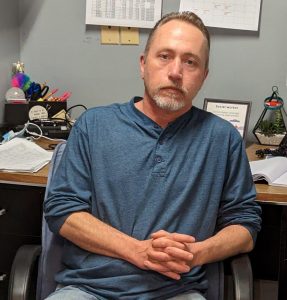Massachusetts Centers Helping Those Struggling With Substance Use
MASSACHUSETTS — April Miller was a police officer who wanted to help people in their recovery process. After leaving the police force, she worked for the Drug Enforcement Administration and then landed at Southeast Rehabilitation & Skilled Care Center two years ago as a Substance Use Disorder Counselor.

April Miller at Southeast
She works closely with people managing drug and alcohol addictions and offers support however they need it. There is also support she gives her fellow staff members at the North Easton center. If a situation arises, Miller can step in and try to ease the tension with the rapport she’s built with the residents.
“If nursing is seeing certain behaviors, and I have a good relationship with a specific person, that’s when I’ll try to intervene and say, ‘Okay, we’re having this behavior, how do we mitigate that?’” she said. “I support social services a lot with some of our SUDs residents who are seeking to be back into the community. For a lot of them, they might not even have simple things, like an ID, to be able to apply for financial support to apply for housing so I can take some time to actually get them re-integrated.”
The recovery process presents differently for everyone. Some are able and willing to accept the help while others aren’t at that point yet. In those cases, Miller said the emphasis is on trying to get them to a point where they are ready for change, and part of that includes harm reduction. Harm reduction techniques, for example, may be encouraging someone to reduce the amount of substance they consume without going abstinent in an effort to help eventually let it go altogether.
Miller said some ways to help encourage people to change habits is by looking at the pros and cons of their usage. If it’s impacting their health, she asks what are ways to mitigate that.
“When you think about recovery, there’s certain stages of change in recovery and, when you go through the recovery process, sometimes you cycle through those stages of change frequently,” she said. “For a lot of these people, they may be thinking, ‘The most pressing issue that I have right now is that, if I don’t figure out what’s going on in my life, I’m going to lose my opportunity to go back to the sober home.’”

Joe Hannon at The Oxford
At The Oxford Rehabilitation & Health Care Center in Haverhill, Joe Hannon wants to instill hope in the people he works with. He has been a Substance Use Clinician at the center since 2018 and finds ways to keep the residents engaged and social through recovery groups, movie nights, and other events to build connections. With his new admissions, he tries to understand what their problems have been and establish goals for them during their stay.
“I feel the opposite of addiction is connection. Addiction is a profound disconnect from yourself, from family, from community so the goal is to try to get the residents to interact and support with each other,” Hannon said. “We try to understand the disease and understand that the underlying emotion associated with our residents when they first get here is fear. Fear is a primary emotion, and if we can make them, feel safe, if we can create a safe emotional space, if we can create a safe physical space, and provide empathy and hopefully listen we’re going to prevent them from escalating to anger.”
Miller explains how it’s often overlooked that people who have substance use challenges frequently have health issues correlated to that. She gives an example where, if someone has been drinking since age 15 and is now 50, they are likely going to have negative impacts on their health that need medical treatment. That medical treatment is being administered by other staff members in the center.
Hannon makes it a part of his job to educate the staff on how to work with people managing substance use disorders and why they may have certain actions. He said some people may not understand what addiction is and what causes it, and he wants to give them the answers. They do work with de-escalation and how they can do so with their words and body language.
“We had that six-session mandatory training last year so I’m doing a refresher on creating a therapeutic environment, how we can use ourselves as agents of change, how every staff member has the opportunity to provide therapy just for the way they engage with the residents,” he said. “If we can let them know that we’re compassionate and we care, that we understand and we’re not judging them, that in and itself is therapy.”
Hannon was recognized this year by their local congresswoman for the work he has done with people managing the disease of addiction.
The Massachusetts teams want the residents they work with to know they have worth and do matter and can do better if they want to. They spend long hours building connections and trust to help in the recovery process. For Hannon and Miller, it’s a passion with the purpose of bettering valuable lives.
If you or someone you know is dealing with substance use, help is available with the Substance Abuse and Mental Health Services Administration at 800-662-HELP (4357).
Follow Athena Health Care Systems on Twitter and Facebook. Interested in a career with Athena? Click here!

